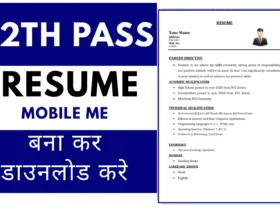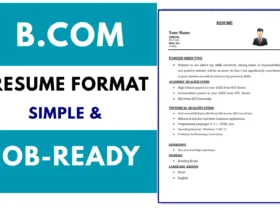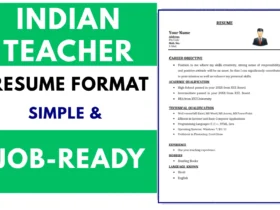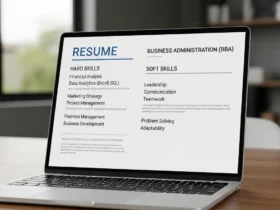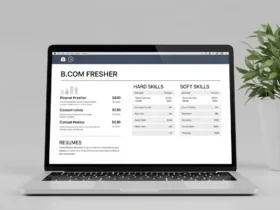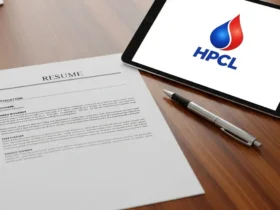So, you’re eyeing that first big break in accounting, huh? Or maybe you’re just a couple of years out of school, ready to step up. Landing a junior accountant gig isn’t just about knowing your debits from your credits. Oh no, it’s also about how you present yourself. And believe it or not, your resume? That piece of paper (or PDF file, let’s be real) is your first, often only, chance to make a good impression.
It’s kind of funny, isn’t it? You spend years learning complex financial stuff, then a huge part of your job search hinges on a single document. But that’s the reality. Recruiters and hiring managers, bless their hearts, are swamped. They spend mere seconds, maybe six seconds if you’re lucky, glancing at your resume. Six seconds! That’s less time than it takes to brew a cup of coffee. So, it needs to grab their attention, quick. It needs to scream, “Hey, I get it! I’m capable, and I’m ready to learn!”
Getting the format right for a junior accountant resume is a big deal. It’s not just about what you say, but how you say it, and where you put it. Think of it like a neatly organized ledger. If everything’s messy, hard to read, or in the wrong place, it’s just frustrating, right? The same goes for your resume. It needs to be clear, easy to navigate, and make sense, even at a quick glance. No one wants to hunt for information. That’s a surefire way to get tossed into the “nope” pile. And you really don’t want that, do you?
Let’s dive into the nitty-gritty. What exactly should a junior accountant’s resume look like? And what specific bits should you include to stand out from the crowd? Because, let’s be honest, there *is* a crowd. Lots of people want these jobs. You need to show you’re not just another face in that crowd. You’re *the* face.
Junior Accountant Resume Format
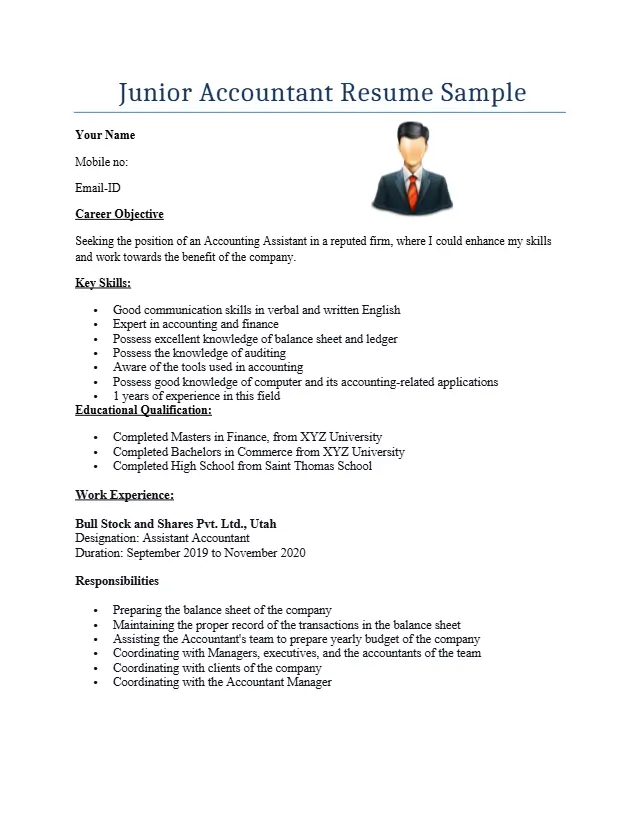
👉 Download Link: [Get Here]
You can:
- Fill it in Adobe or any PDF app
- Print it on clean A4 paper
Your Contact Info:
Okay, this might seem super obvious. “Of course, I’ll put my contact info on my resume!” you might be thinking. And you’d be right. But you’d be surprised how many people make little mistakes here. Mistakes that can actually cost them an interview. Don’t let that be you.
What do you need? Your full name, clearly visible. A professional email address – seriously, now is not the time for “partyanimal23@email.com.” Something like “firstname.lastname@email.com” works perfectly. Your phone number, with the correct area code. And, especially these days, a link to your LinkedIn profile. Make sure your LinkedIn is polished and up-to-date, by the way. It’s like an extended version of your resume, and recruiters *will* check it out. Seriously, they do.
One more thing: your address. You don’t usually need your full street address anymore. Your city and state are usually enough. This is especially true if you’re open to relocating or applying to jobs in different areas. Less is often more, right? Keep it clean, keep it simple. Top of the page, easy to spot. This isn’t a mystery novel where the big reveal is your phone number on page five.
Objective or Summary:
This is a common question, and honestly, the answer depends a bit on your situation. For junior accountants, who might not have a ton of direct work experience, a well-crafted resume objective can be a powerful tool.
An objective statement basically tells the hiring manager what *you* want. It should be short, concise, and clearly state your career goals and what kind of role you’re seeking. For example, “Highly motivated recent accounting graduate seeking a Junior Accountant position at [Company Name] to apply strong analytical skills and a solid understanding of GAAP.” See? It tells them your goal and subtly hints at your value. It works great if you’re fresh out of school or making a career change.
A summary statement, on the other hand, is generally better for those with a little more experience. It highlights your key skills and achievements upfront. For a junior role, if you’ve had a strong internship or relevant part-time work, you *could* use a summary. Something like: “Detail-oriented accounting professional with 1 year of internship experience in financial reporting and reconciliations, eager to contribute to [Company Name]’s finance team.” The trick is, for a junior role, keep it brief – two to three sentences, tops. No one wants to read a novel right at the top of your resume.
Which one should you pick? If you’re really new, go with an objective. If you have some solid, relevant experience (even if it’s just internships), a summary might work better. The most important thing? Tailor it! Don’t just copy-paste. Make sure it reflects the specific job you’re applying for. This shows you actually bothered to read the job description. And trust me, that goes a long way.
Education, Education, Education!
For a junior accountant, your education section is probably one of the strongest parts of your resume. It shows you’ve got the foundational knowledge. Don’t undersell it.
What to include? Start with your degree: “Bachelor of Science in Accounting” or “Bachelor of Business Administration, Major in Accounting.” Then, the name of your university, its location, and your graduation date. If you’re still studying, put your expected graduation date.
Now, here’s where you can shine a little brighter:
- GPA: If your GPA is strong (think 3.5 or higher), definitely include it. If it’s not stellar, you can choose to omit it. No need to highlight something that might work against you, right?
- Relevant Coursework: This is huge! List a few specific courses that directly relate to accounting work. Think Financial Accounting, Managerial Accounting, Auditing, Tax, Cost Accounting, Advanced Excel. This shows you’ve covered the essentials.
- Honors and Awards: Dean’s List, scholarships, specific academic achievements – absolutely include these. They show dedication and excellence.
- Certifications: If you’ve got your QuickBooks certification, or maybe even started studying for the CPA exam (even if you haven’t passed yet, mentioning your intent or progress can be good), put it here or in a separate “Certifications” section.
A common question comes up: what about high school? Usually, once you’re in college or have graduated, you can drop high school details. Unless, of course, you had some truly extraordinary achievement there that’s highly relevant. But for most, your higher education is what matters most to an employer. Remember, keep it focused on what’s important for the job.
Your Experience:
Alright, this is where many junior candidates feel a bit stuck. “But I haven’t *had* an accounting job yet!” they lament. I get it. It’s a classic catch-22: you need experience to get a job, but you need a job to get experience. Maddening, isn’t it?
But here’s the secret: *any* work experience can be relevant. You just have to frame it correctly.
- Internships: If you’ve had an accounting internship, this is gold. Treat it like a full-blown job. List the company, your title, dates, and then bullet points detailing your responsibilities and, crucially, your achievements. Did you reconcile accounts? Helped prepare financial statements? Assisted with month-end close? Quantify everything you can. “Reconciled 20+ accounts monthly, reducing discrepancies by 15%.” See how much better that sounds than “Did reconciliations”?
- Part-Time Jobs: Maybe you worked in retail or food service. How can that be relevant? Think about the *skills* you used. Did you handle cash? Manage inventory? Provide excellent customer service (which requires communication and problem-solving)? Work in a fast-paced environment? These are all transferable skills. “Managed daily cash transactions totaling $X, accurately balancing till at close.” “Provided exceptional service to 50+ customers daily, resolving issues efficiently.” See? Not direct accounting, but shows responsibility and capability.
- Volunteer Work/School Projects: Don’t underestimate these. If you volunteered as a treasurer for a student club, or led a major project that involved budgeting or financial tracking, that’s experience! “Managed a club budget of $5,000, ensuring all expenses were within allocated funds.” Or “Collaborated on a team project analyzing financial data for a hypothetical startup, presenting findings to a panel.” These show initiative and practical application of skills.
- Dates and Specifics: For each entry, include the organization name, your role/title, location, and the dates you worked there (month and year). Use strong action verbs at the beginning of each bullet point: “Analyzed,” “Prepared,” “Managed,” “Assisted,” “Processed.”
The key here is to think outside the box. What skills did you develop? How did you demonstrate responsibility, attention to detail, analytical thinking, or problem-solving? Those are all things an accountant needs. Don’t just list tasks; show how you made an impact. Even a small one.
Skills, Skills, Skills:
This section is vital. It’s where you list the specific tools and abilities you bring to the table. And yes, you need both hard skills and soft skills.
Hard Skills: These are the technical, measurable abilities. For a junior accountant, this includes:
- Accounting Software: QuickBooks, Xero, Sage, NetSuite, SAP, Oracle Financials. List what you know. Even if it’s just a little exposure, mention it.
- Microsoft Excel: This is non-negotiable. Seriously, become an Excel wizard if you’re not already. VLOOKUP, pivot tables, formulas – these are your friends. “Advanced Excel proficiency” or “Proficient in Excel for data analysis and reporting.”
- Other Software: Microsoft Office Suite (Word, PowerPoint), Google Workspace.
- Accounting Principles: GAAP (Generally Accepted Accounting Principles), IFRS (International Financial Reporting Standards – if applicable for the roles you’re targeting).
- Data Analysis: If you’ve used any tools for this, mention them.
Soft Skills: These are your personal attributes and interpersonal abilities. Often overlooked, but super important in the workplace.
- Attention to Detail: Absolutely crucial for accounting.
- Problem-Solving: You’ll be troubleshooting discrepancies all the time.
- Analytical Skills: Breaking down financial data.
- Communication: Presenting findings, collaborating with colleagues.
- Time Management/Organization: Meeting deadlines, handling multiple tasks.
- Teamwork/Collaboration: Working effectively with others.
- Adaptability: Learning new systems, responding to changes.
How to list them? You can use bullet points, or categorize them. Some people like a “Technical Skills” sub-section and a “Soft Skills” sub-section. Just make sure they’re easy to read and understand. And again, tailor these to the job description. If they ask for specific software, make sure it’s prominent if you know it.
Optional Sections:
Sometimes, you’ve got extra things that just don’t fit neatly into the main categories but are worth mentioning. This is where optional sections come in.
- Certifications: If you have certifications beyond your degree, like QuickBooks ProAdvisor, Bloomberg Market Concepts, or even if you’re actively studying for your CPA or CMA, create a separate section. It shows initiative and commitment to the profession.
- Projects: Did you do a particularly impressive project in a class that involved deep financial analysis? Or maybe a pro-bono project for a non-profit? This can be a great way to showcase practical skills. Briefly describe the project and your role.
- Awards and Honors: If you ran out of space in the education section for specific awards, or have non-academic awards, list them here. It adds a bit of sparkle.
- Languages: Fluent in another language? That’s always a bonus, especially in diverse workplaces.
Just remember, these sections are *optional*. Only include them if they genuinely add value and are relevant to the role. Don’t add fluff just to fill space. Every bit of information on your resume should earn its spot.
Formatting Tips

Now for the visual appeal. Even with the best content, if your resume looks like a dog’s breakfast, it’s not going to get a second look. Clarity and professionalism are key here.
- Length: For a junior role, aim for one page. Seriously. Recruiters don’t want to flip through pages for someone just starting out. If you have an exceptionally strong internship background or multiple years of *relevant* part-time experience, you *might* stretch to two pages, but try hard for one.
- Font: Stick to professional, easy-to-read fonts. Think Calibri, Arial, Helvetica, Georgia, Times New Roman. Don’t get fancy with Comic Sans or some swirly script. Font size should be readable – generally 10-12 point for the main body, and 14-16 point for your name.
- Margins: Standard 0.7 to 1 inch margins all around. Too wide, and you waste space; too narrow, and it looks crammed.
- Consistency: This is huge. If you use bullet points for one section, use them for all similar sections. If you bold job titles, bold all job titles. Consistent formatting makes it look polished and professional. It also subtly tells the hiring manager you have an eye for detail. Which, you know, is pretty important for an accountant.
- White Space: Don’t be afraid of it. A little white space makes your resume easier on the eyes and less overwhelming. It helps important information stand out.
- PDF, always PDF: Unless the application specifically asks for a Word document, always submit your resume as a PDF. This ensures the formatting stays exactly how you intended, no matter what software they open it with. No one wants their carefully crafted layout to suddenly jump around.
Common Mistakes
You’ve put in the work. Now, don’t shoot yourself in the foot with silly mistakes.
- Typos and Grammatical Errors: This is a killer for *any* job, but especially for an accountant. Accuracy is paramount in finance. One typo suggests a lack of attention to detail, and that’s the last thing you want to imply. Proofread, proofread, and proofread again. Get a friend, family member, or career advisor to proofread it too. A fresh pair of eyes catches things you’ve stared at too long.
- Generic Resume: Sending the exact same resume to every job application is a huge no-no. It screams “I didn’t care enough to tailor this.” Always, always customize your objective/summary, skills, and experience bullet points to align with the job description.
- Irrelevant Information: Your hobbies of collecting stamps or your high school chess club presidency from five years ago probably aren’t relevant unless they somehow showcase a skill directly applicable to accounting. Be ruthless in cutting out anything that doesn’t add value to your candidacy for *this specific job*.
- Bad Contact Info: We talked about this. Double-check your email and phone number. An incorrect digit means a missed opportunity.
- Using a Photo: In most countries (especially the US, Canada, UK), do NOT put your photo on your resume. It can lead to unconscious bias. Let your skills and experience speak for themselves.
- Too Much Jargon (for the wrong audience): While accounting has its own jargon, make sure you’re using it appropriately. For a junior role, you might be applying to companies outside of strict accounting firms, and they might not appreciate overly technical terms without context. Balance it out.
A Final Word
I mentioned tailoring your resume a few times. This isn’t just a suggestion; it’s practically a requirement in today’s job market. Every single job description is a treasure map. It tells you exactly what the employer is looking for. Your job is to make sure your resume highlights how you meet those requirements.
Read the job description carefully. Underline keywords. Then, go through your resume and see where you can naturally incorporate those keywords and demonstrate those skills. If they mention “financial reporting,” make sure you have bullet points about assisting with financial reports. If they want “QuickBooks experience,” make sure that’s prominently listed in your skills. It’s like solving a puzzle, really. You’re showing them you’re the missing piece.
Think of your resume not as a historical document of everything you’ve ever done, but as a marketing document specifically designed for one product: *you*, for *this specific job*. Every line should be there because it helps sell *you* for *this role*.
And when you’re done, remember those action verbs. Don’t just say “responsible for.” Say “Managed,” “Analyzed,” “Prepared,” “Developed,” “Reconciled,” “Streamlined.” Strong verbs make your achievements pop. They make you sound proactive and impactful, even as a junior candidate.
Finally, give it a last read-through. Then one more. Seriously. You’ve worked hard to get to this point. Don’t let a small oversight trip you up. A well-formatted, compelling resume isn’t just a formality; it’s your golden ticket to that interview. You’ve got this. Now go get that junior accountant job!

